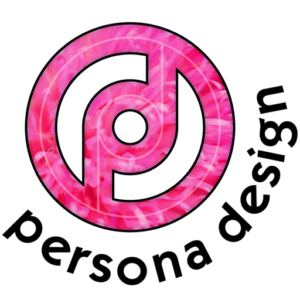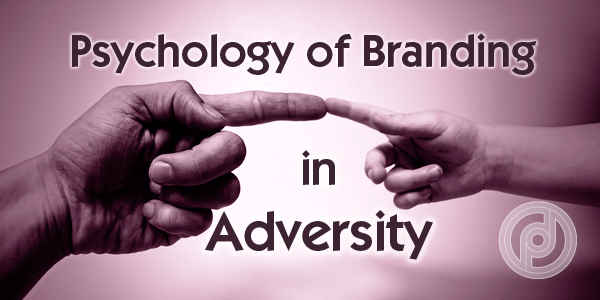
Branding Psychology in Adversity – 7 Ways You Can Embrace Behavioural Shifts to Grow Your Business
Branding psychology matters more than ever in times of adversity because when large groups of people are living with increased fear and uncertainty their behaviour changes. Levels of irrational behaviour increases, the perceived value of money changes, superstition and conspiracy theories become more rampant. This is then amplified further by social and traditional media — all of which massively impacts people’s buying decisions and how they see your brand, product or service, B2B and B2C.
So the question is, if you want to communicate effectively with your customers while they are in a heightened state of anxiety, like during the Covid-19 pandemic, what are you doing to adapt your brand so your messaging and offering resonates appropriately? Without stating the obvious, it’s not business as usual, so how are you changing your brand, your products, your services because your customers are not thinking, feeling or behaving like they did before? Rituals and habits change dramatically, perhaps permanently.
Reflecting carefully on how your customers are feeling is your starting point because research has shown 85% of buying decisions are driven irrationally and only 15% rationally. The fact is, the amygdala, located in the medial temporal lobe of the brain and forming part of the limbic system, plays a key role in processing emotional and unconscious responses so when fear is amplified, it becomes more dominant systemically in driving human behaviours.
Related: Leading in Adversity – 10 Practical Steps to Make Your Brand Work Harder to Grow Your Sales
In a relatively short time of four months in 2020, there has been a massive shift in human behaviour and psychological change globally because of the uncertainty for customers and businesses alike. This affects the psychology of branding, in ways that could be both positive and detrimental depending on your brand, its purpose, what it stands for and how it behaves.
Whatever unfolds in the coming months and years, the Covid-19 crisis has led to the formation of new forms of trust. For example, neighbours are relying more on one another, community has become much more important, nostalgic associations for things associated with ‘safer happier times’ have become stronger, businesses have had to place their trust in government funding or support schemes and many organisations have had to trust their employees to work productively at home instead of in the office. These impact at a grassroots customer, community and business owner level and have real-life impact on businesses large and small, particularly for more leanly resourced SMEs.
Related: Branding in a Crisis, 5 Practical Steps so You Match to the Moment Brilliantly
Customers, now more than ever, are expressing the need to feel anchored. They still have a lot of uncertainties but have started rapidly to adapt. They’ve moved from a sense of being overwhelmed to resolved, from feeling fear to an appreciation for the things that really matter most.
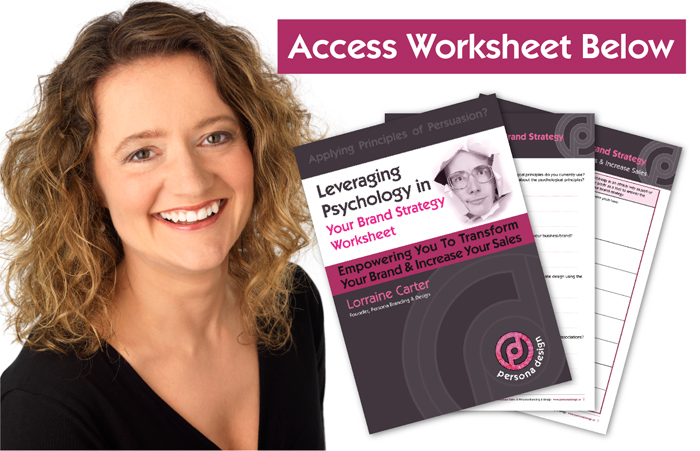
By entering your name and email address, you consent to receive the ebook and the Persona Design newsletter, from which you can unsubscribe at any time. We do our best to keep you inspired with insightful content and you can also review our Privacy Policy here and T&Cs here.
If you’ve never looked at the much-debated Kübler-Ross graph on five dominant aspects of grief or trauma, it’s worth looking at now in the current pandemic context because a lot of the adoption cycle to adversity is reminiscent of aspects of that. Basically, when faced with a sudden major change in circumstances, it’s common first to feel shocked and soon after to feel angry.
Humans evolve quickly and in a situation of adversity, they generally move out of the low feelings and start to adapt to the new reality. We’ve already seen that now in the way both customers and businesses have moved in a short time from being unsure about how to react to Covid-19 to starting to find new ways to do business.
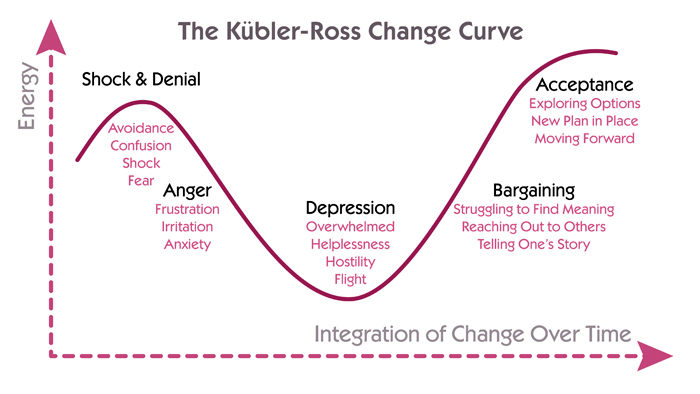
Businesses are people too and it can be doubly worrying in adversity – not only are you concerned for your own wellbeing and that of your loved ones, you have the additional burden of wondering how the business can cope with extreme difficulties and not only survive but thrive again — in perhaps a newly invented form.
It’s not easy, but amidst major upheaval, your business and brand can potentially survive and even thrive with unrelenting focus. In fact, if you recognize behavioural shifts and consider how your business can adapt fast and embrace them, you can emerge out of the current adversity stronger than you went into it.
Here we’re sharing seven ways you can embrace behavioural changes and use branding psychology to grow your business, even in times of extreme adversity.
Top 7 Ways You Can Embrace Branding Psychology in Adversity to Grow Your Business
1. Successful Branding Psychology in Adversity Comes from Clear Brand Archetypes
During the Covid-19 crisis, we’ve observed brands that are clear, straightforward and consistent tend to be better received. In adverse times, people look for security, familiar rituals, traditional activities, nostalgia, simpler things in life and togetherness to counteract the uncertainty.
They also retreat to a more simplistic form of decision making without the luxury of time. In my own experience, when in a supermarket during Covid-19 I have wanted to be in and out as fast as possible, so have only bought brands I know, recognize, like and trust, rather than browsing or spending unnecessary time investigating any alternatives.
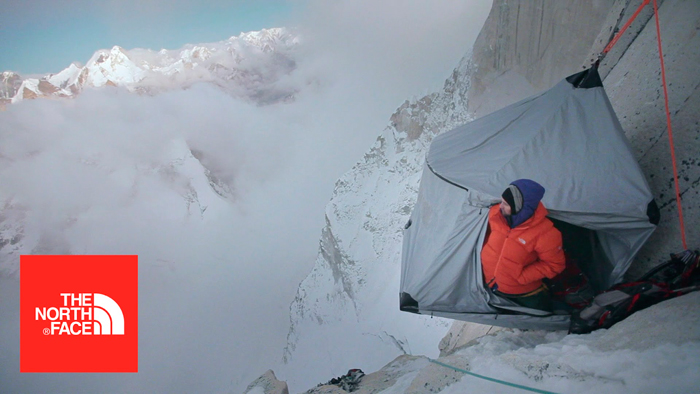
Image via Ads of the World © The North Face
That is where your brand archetype plays a useful role. A brand archetype distils the essence of its character a bit like a person. For example, it can portray itself as honest like Dove, heroic like North Face, creating order like IBM, caring like Great Ormond Street Hospital, compassionate like the Co-operative Bank.
A strong brand archetype makes it easier for customers to cut through the noise, desire and find your brand in a crisis because it immediately meets a requirement they need based on a benefit they have in mind, often subconsciously. The same is also true even outside a crisis. The difference is that in adversity your brand has to work even harder to be noticed with relevant context, communicate what it stands for and build trust.
Brands that are clear about what they stand for and why they are credible to deliver on their promise are far more likely to flourish. Large brands with long histories can struggle to change or streamline their brand archetypes because it’s like trying to change the course of a supertanker.
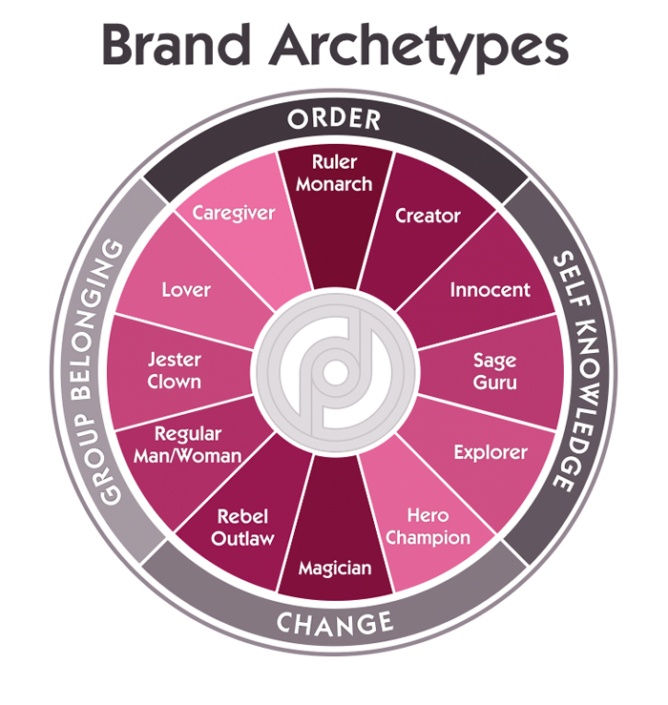
© Persona Design
On the other hand, SMEs are much more nimble and in truth, many haven’t clearly defined their brand archetype so are coming from a low base point already. A crisis offers a great opportunity for you to become crystal clear about your brand archetype now and in future because when decision making is reduced to its basic components, the clearer you are about what your brand stands for, the easier it is for someone to choose you as their ideal solution.
Related: Discover How to Use Brand Archetypes To Build Your Winning Brand
For example, in line with the emotional drivers we discussed above, during Covid-19 lockdown there has been a big surge in home baking. This has led to a much higher demand for ingredients such as flour. Smucker Canada’s Robin Hood brand couldn’t keep up with packaging supplies even though it could produce enough flour [1].
However because its brand archetype has been well-established, shoppers know even without its normal brand packaging that it is a perfect partner for rewarding home baking, as evidenced in the video below of a commercial. Without such a clear brand archetype it wouldn’t be able to sell flour at a premium price in the sort of temporary packaging it had to use to get to market faster.
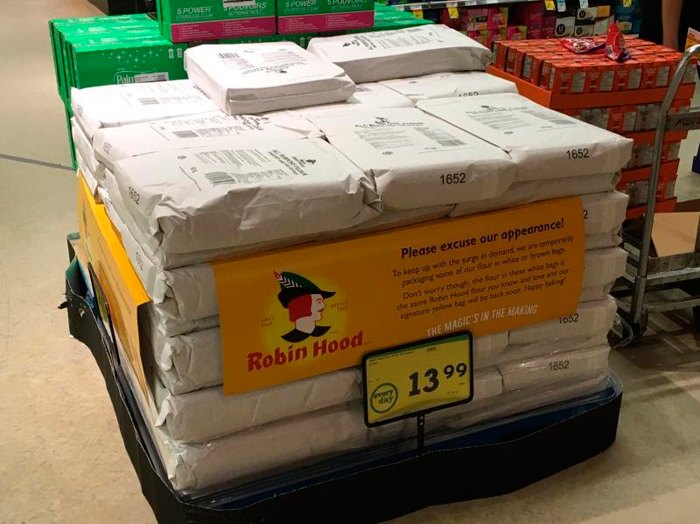
Image via Linkedin © Robin Hood
We know that sometimes it’s a struggle to build a brand strategy that really engages your ideal customers effectively, particularly in adversity, so we’ve developed three different ways of working with us to help you build your brand, depending on your preferences, so if you’d like us to:
- Build your brand for you – find out more here or get in touch [email protected] or ring +353 1 8322724
- Empower you to build your brand – check out the Persona Brand Building Blueprint™ Mastermind here. This is a live, interactive programme online where you work on your brand with us codifying and mapping out your brand strategy for business growth. Alternatively, join our online half-day Branding Accelerator Masterclass for a fast-injection of brand building essentials. Ask about our Personal and Corporate Leadership Brand Alignment Masterclass
- Want a DIY solution? Check out our how to build a brand eprogramme here and our how to audit your brand yourself eprogramme here
2. Togetherness Adds Value for Branding Psychology
Touch and togetherness is a critical need in human wellbeing yet the combined factors of lockdown and social distancing have had a massively negative impact on those basic human needs. People are out of balance, discombobulated because they’re not touching each other through even a simple handshake or hug, or even touching the surfaces around them outside their immediate homes.
Humans are social creatures who normally thrive through experiential interaction with each other yet lockdown has also cut that off too. Consequently, people are craving for experiences, the need and importance of togetherness has never been more explicitly articulated than it has during the pandemic.
The overwhelming desire to fill this basic human need can be seen in all the virtual community engagement that has skyrocketed online. Zoom has become synonymous with everything from virtual happy hours amongst friends to family ‘get-togethers’ with quizzes and games played together online, along with workshops, training and business meetings — it’s become the standard norm.
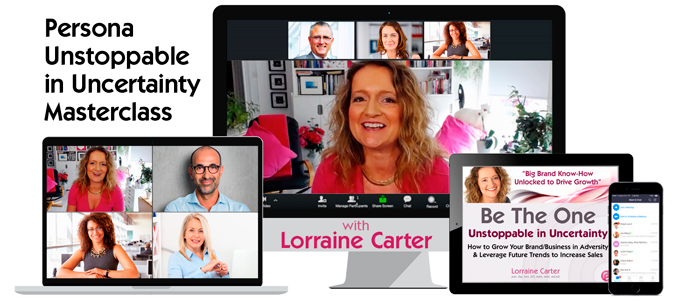
Aside from facilitating masterminds working sessions amongst business leaders and owners (specifically to help everyone move forward strongly through the shared collective wisdom and experience for the greater good) I’ve even been hosting informal ‘Chuckle n’Chats’ amongst friends — who’ve discovered the experience of catching up online for the first time.
But it can also be about physical togetherness and longer-term we expect it to further strengthen the emergence in recent years of “tribes” of people connected by common interests or identities.
With the move to online trading by so much big business, one way in which SMEs can distinguish their offering is often through a strong sense of personable togetherness and human connection. From local offices to real-life staff instead of AI (artificial intelligence) dealing with customers, SMEs can emphasise existing practices in their business which may previously have been undervalued.
Related: Use Psychology in Your Brand Strategy to Create Irresistible Brand Experiences and Increase Sales
A case study is the medium-sized law firm Bellwether Green. Their “Off the Clock” initiative allows clients to call them and talk without being billed, on Covid-19 connected issues [2]. While clients typically don’t feel a sense of togetherness with most law firms because many still operate on a somewhat outdated business model based on billable hours i.e. they bill clients them every time they pick up the phone — this simple campaign enables the brand to benefit from aspects of the strong desire for togetherness that their client base may feel during a time of adversity.
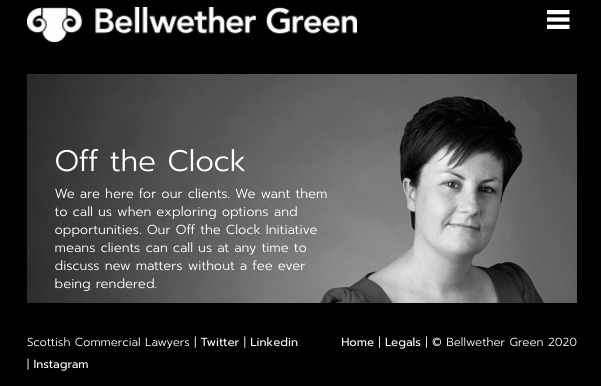
© Bellwether Green
3. Brand Purpose is Critical in Branding Psychology in Times of Adversity
There has been a growing need for a stronger sense of purpose and experience in the emerging and post Covid-19 context. This is simply an acceleration of a trend which has been strengthening for some years, as part of a backlash against some large-scale businesses and a desire to embrace smaller, more authentic-seeming brands.
Purpose can sound like a high-level idea for global companies, but in fact, purpose matters whatever the size of a company. SMEs often have a strong sense of brand purpose, with a founding narrative and brand stories which provide essential direction in communications and brand collateral design. If anything, brand purpose is even more critical when a company is small because that is when it’s at its most flexible. Like growing a plant, choosing the right soil matters, but when the plant gets very big, moving it to different soil gets much harder.
Related: Brand Profiling: How Brand Performance and Purpose Are Inextricably Linked
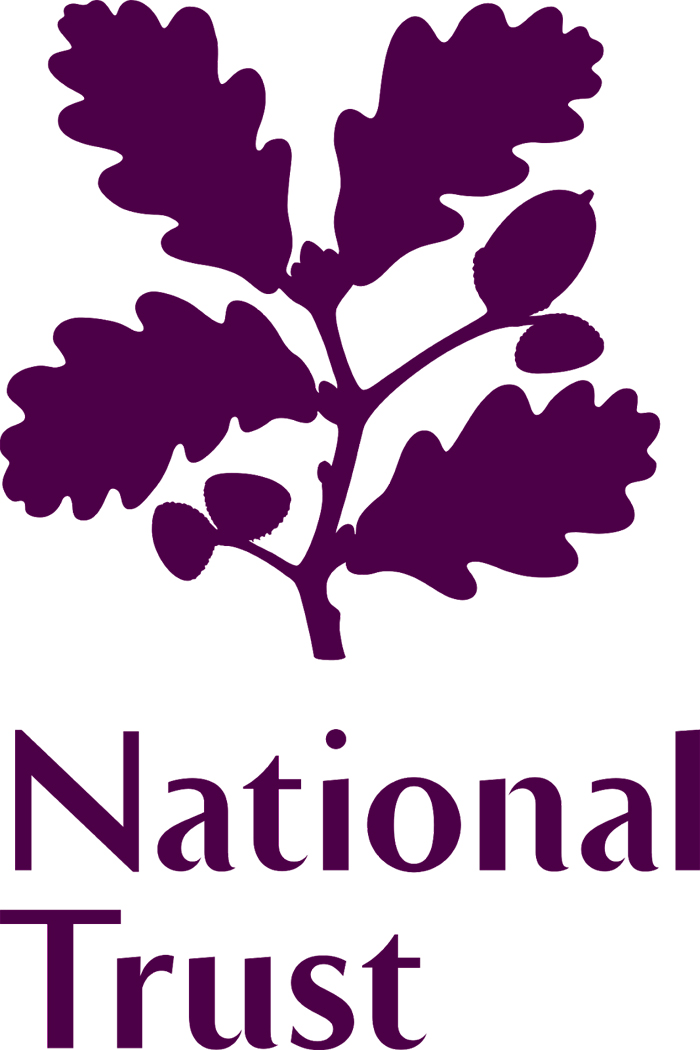
Image via Wikipedia © National Trust
A case study is the U.K. charity the National Trust. They maintain a large number of properties for people to visit as tourists, but during Covid-19 they have had to close them. However, because the charity is clear about its brand purpose — giving people access to historic places, as shown in its brand video below, it was quick to open up its gardens and is allowing access free of charge.
4. Branding Psychology Reveals the Limits of Online
Lockdown has created a new balance with the offline world. People have in many cases spent more time than ever online in lockdown because they are forced to work from home. But that, in contrast, has given them a greater appreciation of offline activities.
In the absence of other entertainment options, there has been an upswing in gardening, reading a real book outside, family meals together at the dinner table, playing board games across age groups and similarly traditional offline activities.
A key lesson from this is that the online world has limits. No matter how convenient or informative it may be, it cannot match other activities for some essential human connection and social needs. So brands figuring out what they can offer which cannot be replicated online offers a clear, sustainable pathway forward. This is an opportunity for brands to build a defensible business which does not live under the constant threat of being usurped by online competitors.
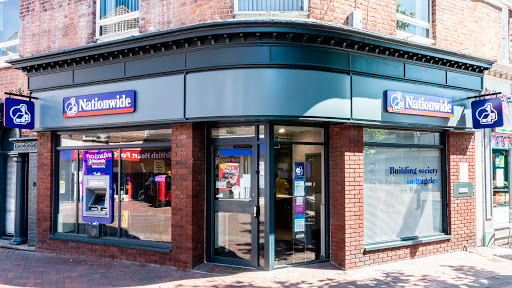
Image via Financial Times © Nationwide
A case study is the Nationwide Building Society. It has used videos during Covid-19 to emphasize services it offers which online-only fintechs do not, such as its branch network and a human face. This is shown in the video below.
Are you a business leader, manager or entrepreneur who wants to re-evaluate or build your brand strategy so you can lead in adversity to increase your sales? Are you curious about how to re-evaluate, build, adapt or scale a highly successful standout brand? Join one of our live, interactive online branding masterclasses because they empower you to build your brand, enhance customer experience, expand your market impact and create higher perceived value so you can command a premium.
In fact, the live, interactive online Persona Brand Building Blueprint™ Mastermind is all about fast-tracking you, your brand and your business through the brand building, agile branding strategy process using professional big-brand know-how with proven systems that get results so you can grow your business faster and more effectively.
The programme enables you to make your brand highly visible, different, credible, trustworthy, memorable and much loved amongst your ideal customers so you can become more profitable and leave your competitors way behind. Be The One — your ideal customers’ favourite brand of preferred choice commanding a premium.
If you want a tailor-made solution specifically for your brand then we also provide inhouse bespoke Persona Brand Building Blueprint™ Intensives working with you and your team so you can grow your business faster and more profitably. Contact us to discover more [email protected] or +353 1 8322724
5. Back to the Future, Branding Psychology Favours Familiarity
There has been a return to basics. Sentimental references and traditional activities have come back into vogue, from knitting to reruns of classic comedies on television. Although this has been increased by Covid-19, it was a trend which was already in evidence.
Millennial consumers had increasingly been looking for ways to connect to a slower pace of life, with slow T.V., slow radio and activities like crochet and knitting entering the hipster mainstream [3].
The key thing for an SME business leader, owner or entrepreneur to understand about this is that some elements of a return to the past are attractive, such as perceived simplicity, bucolic pureness and a slower pace of life.
However, some elements of the past are best left there: variable quality standards, mind-numbing work and limited social mobility, for example. So it’s possible to cherry-pick design cues and elements which evoke a positive, sentimental connection to the past without necessarily needing to go full retro.
Related: Brand Disruption as a Business Framework for Future Growth
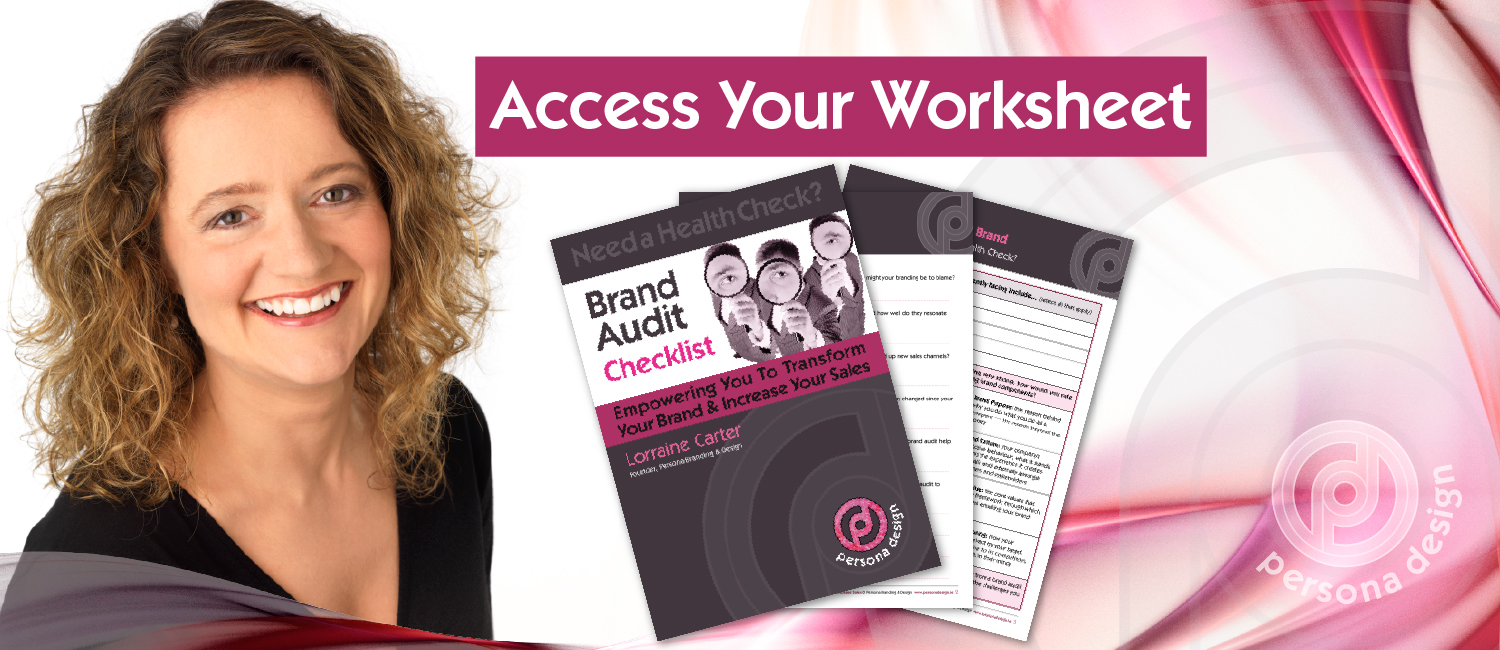
6. The Importance of Neighbourhood and Local Community and Brand Psychology in a Crisis
In adversity, people’s horizons expand in some ways but they dramatically narrow in many other ways. We have seen in the Covid-19 response a return to a level of community at the town and even street level which previously many people assumed might have been gone forever.
There’s almost a backlash to excessive consumerism as customers discover the ‘stuff’ they thought was essential to their daily or weekly existence no longer matters. In fact, customers are showing a new appreciation for only buying what’s really needed because it’s not only become critical in order to survive the financial strain but also good for the planet and sustainability. Solidarity and community, taking care of neighbours and supporting local businesses has become the order of the day.
This has created new or renewed opportunities for SMEs, for example offering their own home delivery service in certain areas. There is a renewed desire to support local businesses which means that consumers are willing to pay a price premium for neighbourhood-based businesses over national or global ones.
Related: Brand Crisis – How to Manage, Survive and Thrive
Thunder’s Bakery is a great case in point. An SME business in its 51st year with immense provenance in the ‘local’ Dublin community, it has 12 locations around the city. It’s been serving generations of local families, friends and older customers with its homemade bakes and signature special occasion cakes for decades. The Thunders Bakery brand purpose is:
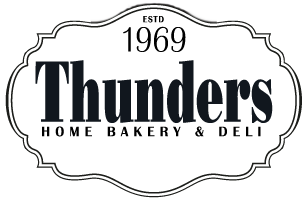
“To make special occasions even more memorable with our hand-made baking personalised to each of our customers’ needs so we enrich their lives by offering more than the icing on their cake.”
However, Covid-19 presented the business with unprecedented challenges requiring Sinead Heffernan and her husband to close with lockdown mid March 2020 and all 150 staff temporarily furloughed.
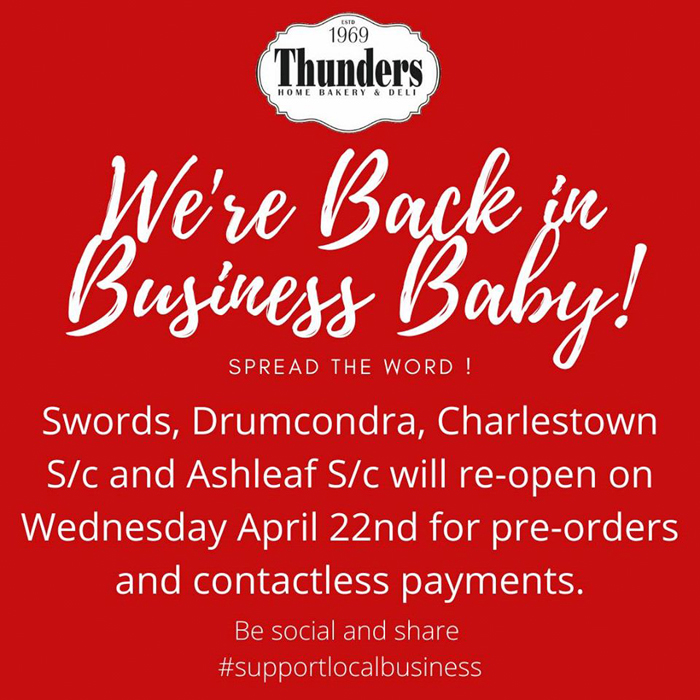
© Thunders Bakery
As they started re-opening a few locations each week from the end of April 2020 the business had to rethink because social distancing meant little room for eating indoors. A lot of their customers were also still working remotely, older vulnerable customers were still cocooning at home and social distancing meant no large numbers of people gathering for special occasion cakes.
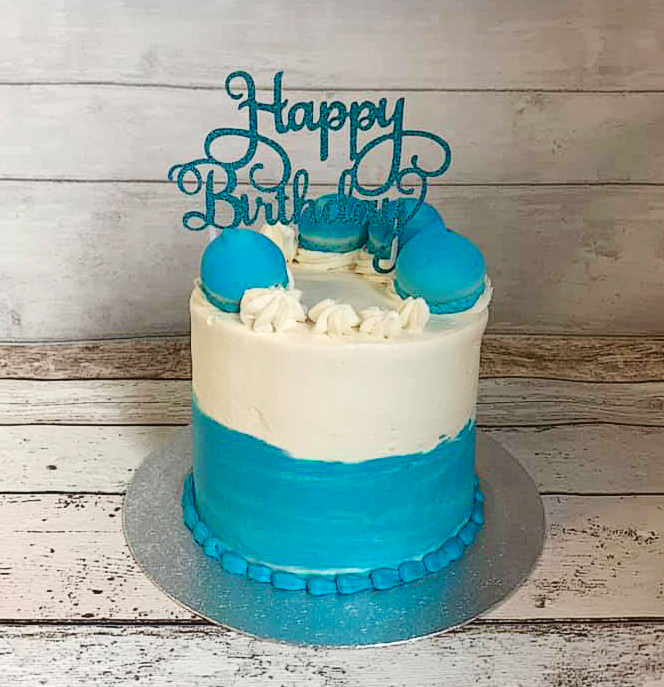
© Thunders Bakery
They adapted fast and brought to market a new range of delicious ‘fun size’ special occasion cakes more suited to families at home and weekend bakery goods hampers in a matter of weeks — all sold online and delivered to customers’ homes nationwide. The new weekend hampers were sold out in a couple of days as customers supported local. This agility to adapt in a radically different trading environment is what is helping this business get back on its feet — and it’s staying true to its bigger purpose as it continues to serve its local communities for generations to come.
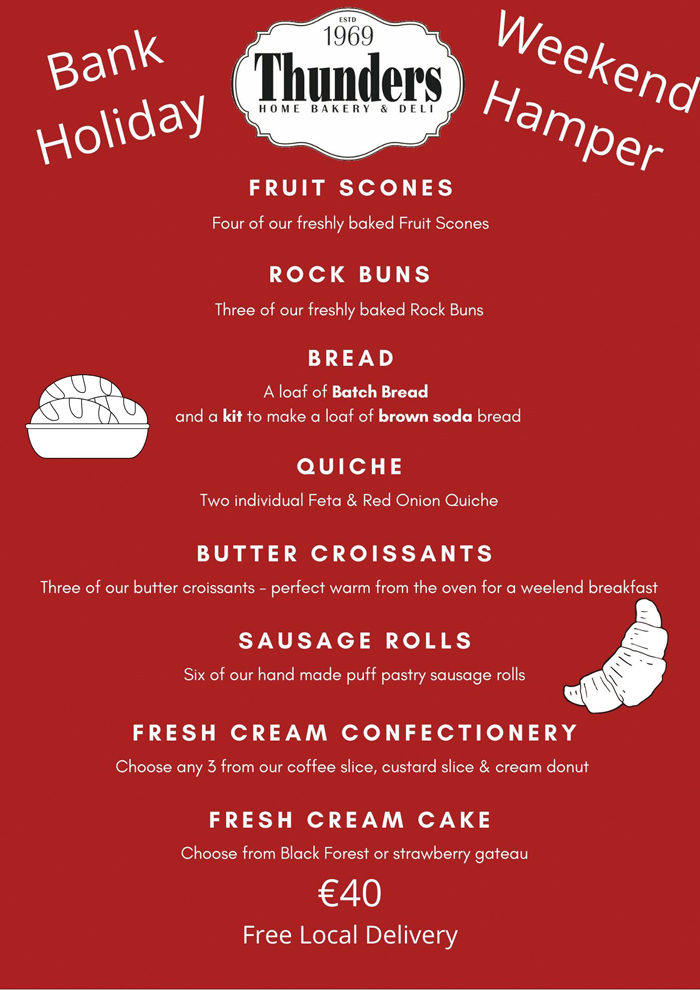
© Thunders Bakery
If you’d like to discover more about building and maintaining a thriving, high performing, highly profitable standout brand so you’re unstoppable in uncertainty, then get in touch because we’d love to help you make your brand into a profit powerhouse — Be The One — leading in adversity.
- Schedule an appointment — we can meet in person or online
- Allow us to create a customised plan for you
- Let’s implement the plan together
- Contact us [email protected] or ring +353 1 8322724 (GMT Dublin/London time 9:00 – 17:30 weekdays)
Lorraine Carter is a branding expert and international speaker delivering talks live online that inspire and motivate along with live, interactive online masterclasses and workshops that inform and support transformational outcomes fast, and consultancy expertise that solves problems — using agile branding strategy underpinned by professional big-brand know-how — so you can outshine, outperform and leave your competitors way behind.
She enables you to Be The One — your ideal customers’ favourite brand — commanding a premium with 7-figure growth.
7. Brands with Great Experiences do Better in Branding Psychology
Making a brand more experiential is a good strategy whatever the environment. In adverse times, though, some forms of experience take on more heightened importance.
In the Covid-19 crisis, we have seen that experience comes into its own during adversity [4]. Small comforts and conveniences take on more meaning so a well-thought-out experience is typically more robust because when normal life is disrupted, even small experiences can take on bigger meanings.
Related: Brand Audits: Why You Need Them and How to Perform One
One of the key things about experience is that to work well it needs to be delivered consistently. This can be harder to do for a mammoth brand which relies heavily on outsourcing or has long lead times. For an SME it is typically easier to redesign an experience fast and also to ensure consistent delivery.
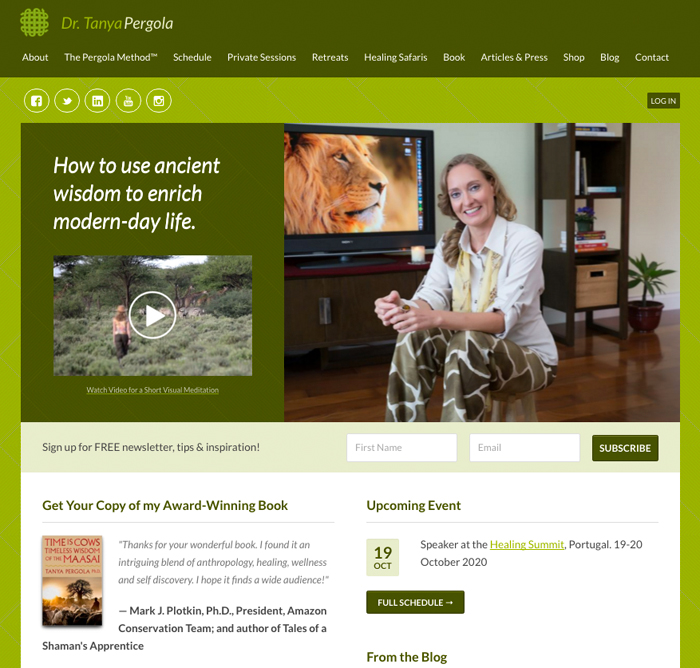
© Dr. Tanya Pergola
Take for example Dr. Tanya Pergola PhD, RYT, her focus across her two SME businesses and charitable foundation, Terrawatu in Tanzania, is wellbeing and how to use ancient wisdom to enrich modern-day life. Her brand purpose is:
“To enable you to improve your mental and physical wellbeing by giving you tools created using ancient wisdom traditions with cutting-edge science so you can enhance your life and the lives of those around you.”
Like a lot of businesses, Dr. Pergola normally operates predominantly in an offline world. However, that clearly isn’t very doable during a pandemic so she’s taken everything online because the need for managing our health both in terms of mental and physical wellbeing has never been so urgent in modern times.
In recent years, scientific research has proven that the age-old practices of meditation, storytelling, conscious eating and movement are very efficacious in helping keep you healthy, centred and at peace. So now, more than ever, is the time to incorporate these practices into our lives, with even more conscious application.
In order to serve her global community, Dr. Pergola has created a carefully crafted and deceptively simple, yet powerful programme, that can be done from the comfort of your own home — online with her. It’s also completely customized to each individual’s needs and all sessions are private. Better still, you do not need any previous experience to benefit.
Dr. Pergola has also developed group programmes, again based on ancient wisdom through The Pergola Method™, which are also available online and have proven to be extremely popular with participants signing up from all around the world. Unlike her geographically based physical programmes you can now access The Pergola Method™ to enhance your wellbeing from your own home and she can serve a far bigger community than she ever did before.
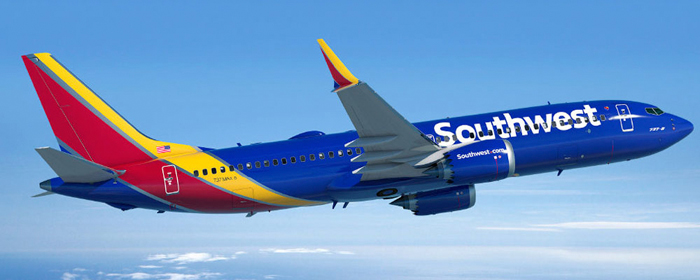
© Southwest Airlines
Looking at this in the larger business context is the U.S. budget airline Southwest. It is well known for its excellent customer experience, which is partly enabled by its brand culture which empowers frontline staff [5]. For example, they can instantly authorise substantial customer refunds on the spot if they think it will help the customer.
Related: 6 Brand Culture Do’s and Don’ts for Attracting and Retaining Your Ideal Customers and Top Talent
Final Thoughts
In adverse times, the psychology of customers, clients and staff can change. Understanding these changes is critically important because it enables you to lead your brand effectively so you can flex with them not against them.
It is important to be clear about your brand archetype so you can resonate with your customers effectively, stand out, differentiate, build and sustain trust.
More traditional factors such as togetherness, familiarity and a sense of community gain strength, so smart brands can tap into this.
The way people live offline as well as online changes, which can offer a boost to SMEs who often have a sizable offline presence in the physical world.
Despite the changes, some things are constant. The fact is winning brands are built with clear brand purpose and deliver great customer experiences, both in adverse times and ‘normal times’.
So regardless of the market or trading conditions, if you don’t have a strong brand strategy providing direction for those essential commercial decisions and marketing communications in your business then it is much harder to thrive or even survive when the market is buoyant in the broader context.
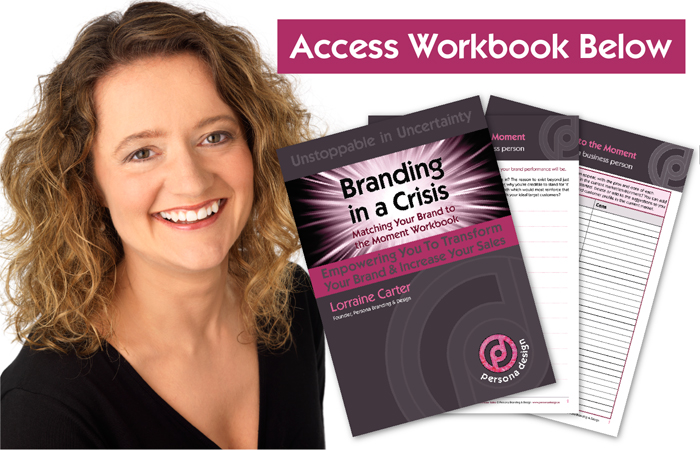
By entering your name and email address, you consent to receive the ebook and the Persona Design newsletter, from which you can unsubscribe at any time. We do our best to keep you inspired with insightful content and you can also review our Privacy Policy here and T&Cs here.
Questions to Consider
- What sort of ‘archetype’ does your brand represent, in one or two words?
- Can you summarise your brand purpose in one sentence? It’s it compelling internally and externally? Does your team and core target audience find it compelling?
- What offline assets could you utilise more effectively in adversity?
- What are the communities in which your brand is best-loved, both virtual and actual?
- What could you do in the short-term to optimise your customer experience?
- Could a brand audit health check help you identify your weakness, strengths and opportunities to not only survive but thrive in uncertainty?
Your Persona Client Satisfaction Guarantee
- When you work with us we’ll create a customised brand-building plan and strategy with clear investment for you tailored to your specific requirements and preferences
- You’ll know each step of your brand building journey before we start because we’ll discuss it, document it and agree on it with you before work commences
- You’ll have timelines, key milestones and deliverables to evaluate and approve for each stage and part of your brand building process
- Because we know the unexpected sometimes happens we can make adjustments along the way if you need it and if something extra is requested we’ll ensure you’re fully appraised about what that entails before committing
- As we achieve pre-agreed objectives you’ll be able to evaluate your brand building work and strategy in progress, coupled with the outcomes to ensure return on investment
Get in touch today because we’d love to enable you to re-evaluate and build your standout, powerhouse brand so you can Be The One — increase your profits and leave your competitors way behind.
Email us [email protected] or ring us +35318322724 (GMT 9:00-17:30) and ask about our VIP Brand Strategy Re-Evaluation.
Sources
- https://www.cbc.ca/news/business/robin-hood-flour-baking-yellow-bags-1.5541483
- https://www.bellwethergreen.com/who-we-are/initiatives/off-the-clock/
- https://www.forbes.com/sites/darrendahl/2017/07/28/why-do-southwest-airlines-employees-always-seem-so-happy/#2d78b3d359b0
- https://www.mckinsey.com/business-functions/marketing-and-sales/our-insights/adapting-customer-experience-in-the-time-of-coronavirus
- https://www.forbes.com/sites/darrendahl/2017/07/28/why-do-southwest-airlines-employees-always-seem-so-happy/#2d78b3d359b0
